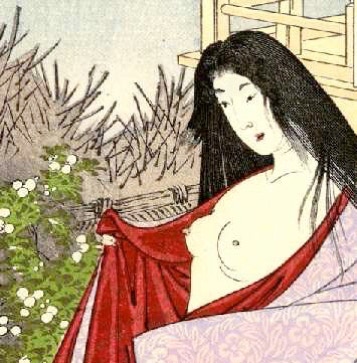Ruri
Ruri is fictional. I took her name, meaning "lapis lazuli," from the "Jeweled Chaplet" chapter of The Tale of Genji, where Murasaki Shikibu uses it for the character of the young woman who first appears as "Lady Ruri" but eventually comes to be known by the name Tamakazura. This is a case of plucking something from The Tale of Genji and planting its root in Murasaki's life. The poems I identify as Ruri's are all in Murasaki's Collected Poems, attributed merely to "someone."
For example, when Murasaki breaks off their relationship, I attach her feelings to the following:
Someone who was lovesick wrote to me in distress, and I replied as follows. It was sometime in the eleventh month:
Shimo kouri/ Tojitaru koro no/ Mizukuki wa/ E mo kakiyaranu / Kokochi nomi shite
Frozen stiff/ By ice and frost/ My writing brush/ Cannot express/ The inexpressible.
The person replied:
Yukazu tomo/ Nao kakitsume yo/ Shimo kouri/ Mizu no ue nite/ Omoinagasamu
It flows not/ Yet persevere;/ Ice and frost/ May float my pain away/ On the surface of the stream.
(Richard Bowring translation)

Ruri's character, disdainful of men, scornful of the niceties of cosmetics, and enamored of insects, was inspired partly by my own childhood interest in lepidoptera, partly by a twelfth-century story called Mushi Mezuru Hime (translated by Arthur Waley in 1929 as "The Lady Who Loved Insects") and partly by Vladimir Nabokov's character Ada who proclaimed "Je raffole de tout ce qui rampe" ("I'm just crazy about everything that creeps").